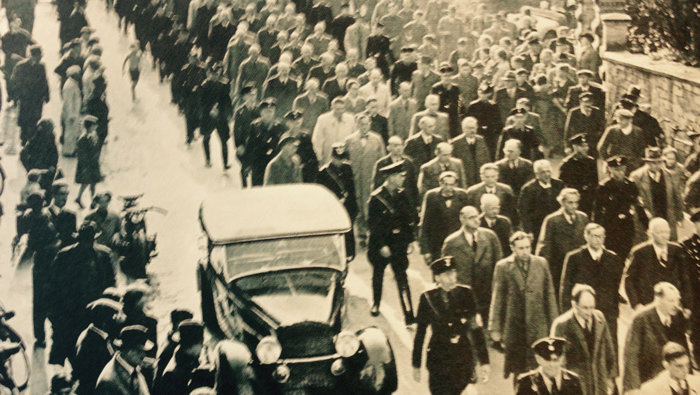[vc_row][vc_column][vc_column_text]Amos N. Guiora, J.D., Ph.D., is an advisor to Alliance for a Better Utah, professor of law at the S.J. Quinney College of Law, University of Utah and the author of “The Crime of Complicity: The Bystander in the Holocaust.” This commentary originally appeared as an op-ed in The Salt Lake Tribune.[/vc_column_text][/vc_column][/vc_row][vc_row][vc_column][vc_single_image image=”11160″ img_size=”large” add_caption=”yes” alignment=”center” onclick=”custom_link” img_link_target=”_blank” link=”https://crimeofcomplicity.com/photos/”][/vc_column][/vc_row][vc_row][vc_column][vc_column_text]
The 24-hour news cycle is exhausting. News fatigue is an increasing malady. Thoughtful, engaged people raise their hands and, like Roberto Duran, say, “No mas.”
On the one hand, this is understandable. After all, how much news can an individual digest in one day? ICBM’s from North Korea. Matt Lauer’s endless sexual assaults only pale in comparison to Harvey Weinstein’s criminal behavior. General Flynn “flips.” Jared Kushner appears to be implicated in serious legal issues. Tax cuts — are they good or bad for me?
Whew. That’s a mouthful.
On the other hand, passivity in the face of extraordinary events comes with a cost. History has, repeatedly, demonstrated — tragically and compellingly — that disengagement clears the playing field for extremists. There is great danger, obviously, in the middle — whether right or left leaning — metaphorically muting the sound button.
Regardless of one’s political slant, politics in America these past few years has been ugly. This is, unfortunately, not new. One recalls Sen. Joseph McCarthy. The assassinations of President John F. Kennedy, his brother, Sen. Robert F. Kennedy, and the Rev. Dr. Martin Luther King Jr. The race riots of 1964, 1965, 1967 and 1968 and the violent actions of the Weathermen. These are but examples of hatred and violence that traumatized the U.S. in a different era.
However, there is — I suggest — a difference at the moment that requires our attention and makes “couch sitting” fraught with danger. The distinction between the contemporary era and years past is the power — positive and negative — of social media.
[/vc_column_text][/vc_column][/vc_row][vc_row][vc_column][vc_single_image image=”11156″ img_size=”large” add_caption=”yes” alignment=”center” onclick=”custom_link” img_link_target=”_blank” link=”https://unsplash.com/photos/loAgTdeDcIU”][/vc_column][/vc_row][vc_row][vc_column][vc_column_text]
Growing up in Ann Arbor, Mich., in the 1960s, a hotbed of student activism — after all, the editors of the Michigan Daily were leaders of the Students for a Democratic Society (SDS) –the news arrived via TV, radio and the Ann Arbor News. There was a reassuring and predictable pattern and rhythm to how news was delivered. Not that the news was necessarily soothing.
For many, Walter Cronkite — the iconic CBS newscaster — was the avuncular uncle calmly informing his public what they needed to know. There was something reassuring in his measured, controlled, serious, yet comfortable, tone and delivery. We were assured.
That is no longer the case. News comes in all forms. Some of it accurate; some of it simply false and incorrect. Those who convey false information — such as Brian Ross of ABC News — must be sanctioned. The information-disinformation “tit for tat” exacerbated or facilitated — depending on one’s perspective — by the anonymity guaranteed by social media is a profound game-changer. It has a direct impact on the political culture and our obligation in the face of hate.
Words have meanings.
I know this because I have been the target of death threats. The threats were in response to some of my writings. It is most unsettling. It is also empowering. It presents a “black-white” narrative: Will racism, extremism and violence prevail, or will the voices of reasoned, civil debate carry the day. Reasonable minds can disagree.
However, reasonable minds do not write (as was the case with me): “You f—— Jew bastard, the f—— train is waiting to take you to f—— Auschwitz.”
My parents are Holocaust survivors. My mother hid in a Budapest attic similar to Anne Frank. My late father survived two death marches. Passivity would not have enabled them to survive the horrors of Nazi Germany and its virulently anti-Semitic Hungarian collaborators. The murder of 450,000 Hungarian Jews in six weeks speaks for itself.
Survival required action. Hitting the mute button was not an option.
By analogy, that metaphor applies today. The political battleground is, frankly, nasty, sometimes violent. Racism and violence are clearly in the air. To gainsay that is fraught with danger.
To be a bystander is, presently, a dangerous option. Its consequences are significant. In that spirit, public engagement — on whatever level and whatever one can do in the context of daily life and its stresses and complexities — is, truly, the call of the hour.
We need not agree, but we sure as hell must engage.
[/vc_column_text][/vc_column][/vc_row][vc_row][vc_column][vc_facebook][/vc_column][/vc_row]

